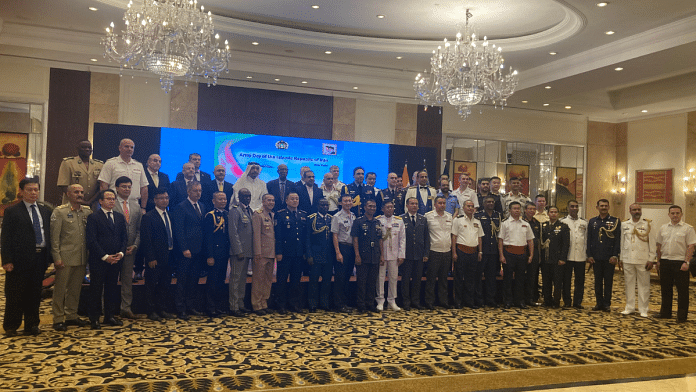New Delhi: Referring to the North South Transport Corridor (INSTC) and the Chabahar Port as the “hallmark” of bilateral relationship, India’s military intelligence (MI) chief Lt. Gen. R.S. Raman termed the Iranian Army’s role as a “stabilising force” that has “contributed to ensuring peace in the Persian Gulf”.
Lt. Gen. Raman, the Directorate General of Military Intelligence (DGMI), made the remarks Monday evening at an event organised by the Iranian Embassy here to celebrate its Army Day.
His comments come at a time when tensions have erupted in the West Asian region after Israel allegedly struck an Iranian diplomatic compound in Syria, which led to Tehran hitting back with a salvo of over 300 loitering munitions and missiles including ballistic.
“Our two nations have stood side by side. The North South Transport Corridor (INSTC) and the Shahid Beheshti (at Chabahar) port is a hallmark of our cooperation. As a part of Iran’s Look East policy, India figures predominantly,” Lt. Gen. Raman said.
The International North South Transport Corridor (INSTC), an alternative route to the Suez Canal, will see Indian goods reach Russia via Iran. First proposed in 2000, the project has seen 10 countries apart from the first three sign up, namely: Azerbaijan, Armenia, Kazakhstan, Kyrgyzstan, Tajikistan, Ukraine, Turkey, Oman, Belarus, and Syria.
India has committed nearly $500 million towards the construction of the Shahid Beheshti port in Chabahar, Iran. The deep sea port is not a part of the INSTC. However, its strategic location has seen India send goods to Afghanistan, circumventing the land route through Pakistan.
The DGMI highlighted other facets of the India-Iran relationship, including how Tehran was made a member of the Shanghai Cooperation Organisation under the Indian presidency. He also acknowledged the Iranian Army’s role as a “stabilising force” that has “contributed to ensuring peace in the Persian Gulf”.
“There have been a number of military courses held by both sides to maintain ties among junior and mid-level officers. One Iranian officer is completing his course at the National Defence Academy in India, one officer is attending a course at Mhow and two are finishing their courses at the Defence Services Staff College at Wellington,” Raman said.
Also read: A dormant transport corridor between India, Russia, Iran is active 20 years later. Here’s why
Strength of India-Iran ties on show in Islamabad
Meanwhile, another marker of the strength of ties between India and Iran was seen in Islamabad Monday. During a press conference held by Pakistani Prime Minister Shehbaz Sharif and Iranian president Ebrahim Raisi, Sharif raised the issue of Kashmir, thanking Raisi for “Iran’s support”.
Raisi refused to acknowledge or reciprocate Sharfi’s words, instead focusing on the conflict in Gaza.
Speaking at the event, Iranian ambassador to India Iraj Elahi said the contemporary history of the world had seen many conflicts — many wars in Europe, Asia and Africa in recent decades.
“In such circumstances, the Islamic Republic of Iran is proud to be the anchor of stability and security in the West Asian region with its independent, self-reliant and strong armed forces,” Elahi added.
The envoy said the message of Iran’s armed forces to all neighbouring countries and the world was “peace, friendship and security”. The country’s approach was also grounded in peace and cooperation, he said, while “fiercely” defending its security and national interest against any threat.
“The military doctrine of the Islamic Republic of Iran is based on active defence and deterrence. Deterrence for the establishment of peace and security at the national and regional levels,” Elahi said.
He added: “Within the framework of this doctrine, talking about the recent present, the Islamic Republic of Iran has been forced to take preventive measures against Zionist Regime (Israel), within the framework of the well-known principles of international law.”
As a part of its actions against Israel, Iran also seized a container ship, MSC Aries, owned by a firm which is part of Israeli billionaire Eyal Ofer’ Zodiac Group of companies.
Seventeen of the 25 crew members on the ship were Indians when it was captured.
However, as reported by ThePrint earlier, sources in the Iranian embassy said the crew have not been detained and were free to leave the ship. One Indian crew member, Ann Tessa Joseph, returned home last week.
(Edited by Tikli Basu)
Also read: Indian delegation discussed access to Chabahar, humanitarian assistance with Taliban, says MEA




Shukran Allah. Allah had put some sense into the India’s Military Intelligence chief as he now supports the IRGs actions. We need more such people in the Indian Army.
Intresting that Raisi avoided echoing Pakistan’s assertions regarding Kashmir. The once upon a time camaraderie between Pakistan, Turkiye, Iran & Malaysia of forming an alternative to the OIC is long gone.